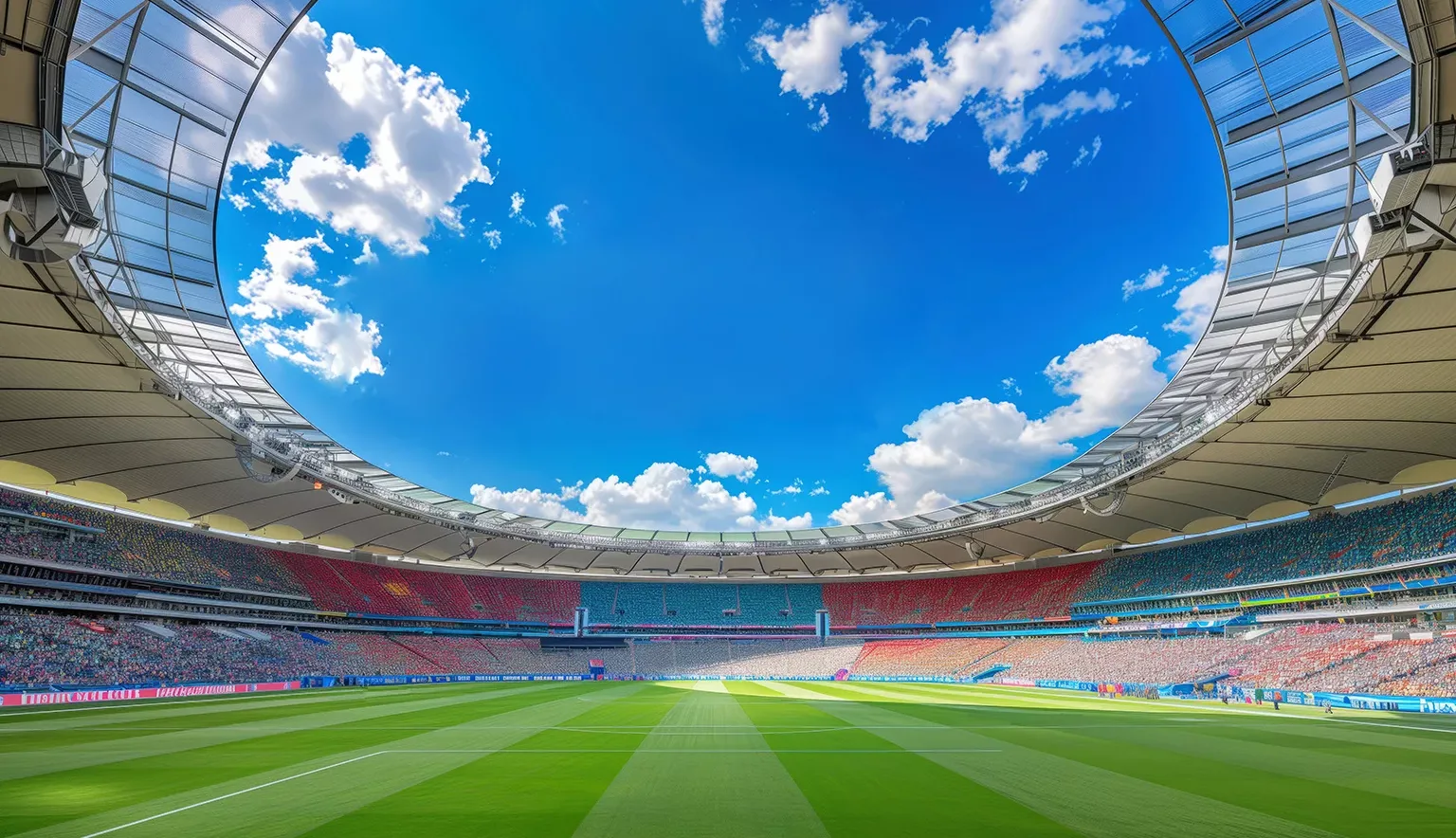As Germany welcomes the continent to this year’s EURO 2024 football tournament, we round up the 10 host cities staging the summer showpiece.
BERLIN
A thriving cosmopolitan metropolis in the heart of Europe, Berlin pulsates as one of Germany’s most exciting and diverse cities.
The capital is brimming with culture and a moving history, one that hardly any other city has experienced. Memories of the Berlin Wall are still very much alive, with remnants of the former Cold War divide between East and West remaining a physical part of the urban fabric to this day, 35 years after it fell.
Along with sightseeing opportunities of historical significance, Berlin’s trendy neighbourhoods also offer countless restaurants and clubs, making it a destination of choice for people the world over. The EURO 2024 final will be held on July 14th at Olympiastadion Berlin, which has a capacity of 71,000 and is the tournament’s biggest venue.
HOW: Travel to the city centre is convenient from Berlin Brandenburg Airport, which is located 30 kilometres (km) to the south-east. To get to Berlin by train, Berlin Central Station is the main transfer point between long-distance and local transport services. From here, you can easily reach some of the city’s iconic sights on foot, by bike, or via public transport.
COLOGNE
Sat on the picturesque River Rhine, Cologne is Germany’s oldest city and home to the country’s most visited landmark.
Cologne Cathedral, a UNESCO World Heritage Site since 1996, attracts an average of six million people a year and stands as the world’s tallest twin-spired church. Construction of this Gothic masterpiece, which began in 1248, took place in several stages and was not completed until 1880.
The cathedral is a powerful testimony to the strength and persistence of Christianity in both medieval and modern Europe, containing unique treasures such as the Shrine of the Three Kings.
Cologne Stadium, the home of 1. FC Köln, is hosting five matches during EURO 2024 – four group games and a Round of 16 fixture.
HOW: Cologne Bonn Airport and Cologne Central Station both have frequent connections to major European cities by air and rail, respectively. Once in the city, it is pedestrian-friendly and easy to explore all the main sights.
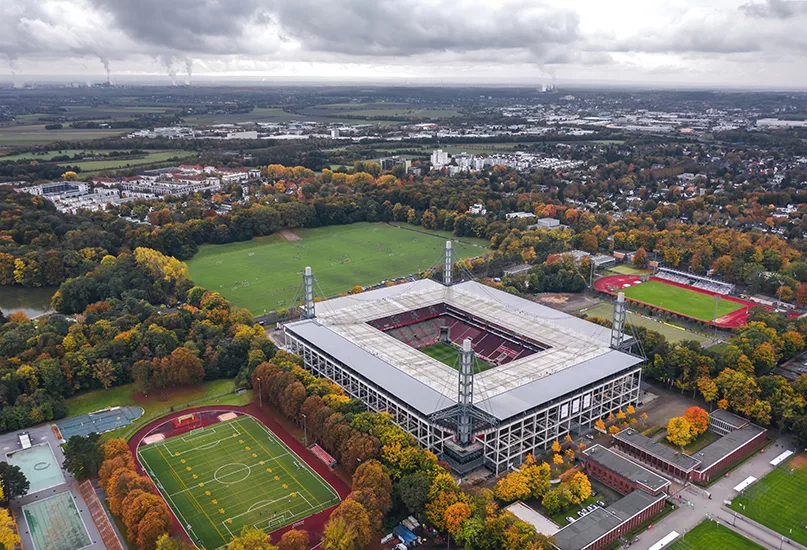
DORTMUND
Once predominantly known for coal, steel, and beer, the vibrant and lively cultural heart of the Ruhr region has evolved into a major technology hub over the past half a century.
With its rich sporting heritage on show at the German Football Museum, the city lives and breathes the beautiful game and is home to the internationally renowned powerhouse, Borussia Dortmund. The club’s ground, BVB Stadion Dortmund, is staging six games during the tournament, including one of the semi-finals.
The sport plays a significant role in the community, which eagerly awaits the arrival of fans from across Europe for this summer’s showpiece. Expect a warm welcome from the residents of Dortmund as you explore the city’s exciting industrial culture and embrace the football festivities.
To truly experience Dortmund, visit its energetic bars and local pubs, where you can enjoy both traditional and modern dishes and drinks.
HOW: By air, Dortmund Airport and Düsseldorf Airport are both good options. Dortmund Central Station is the main transport hub, with around 130,000 daily travellers and 16 platforms just a few minutes’ walk from the centre. Navigating between key sites in this city of short distances is a breeze.
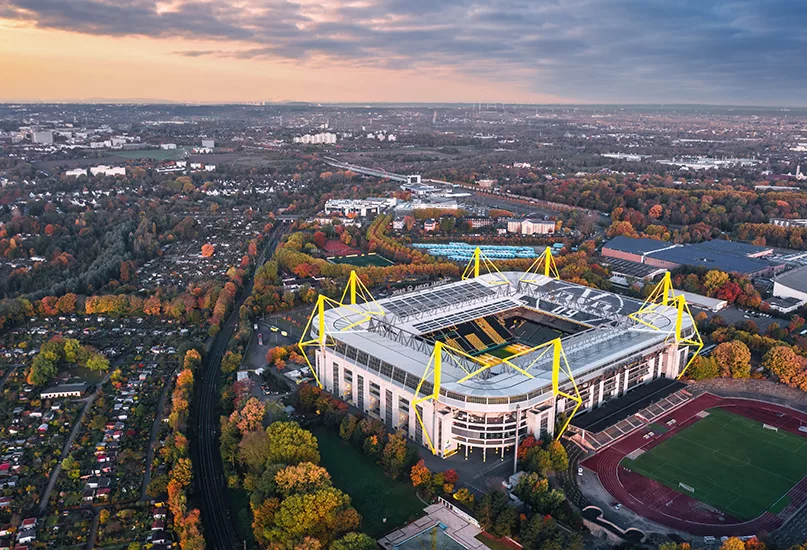
DÜSSELDORF
Everything is close at hand in the capital of North Rhine-Westphalia, as the country’s only major city to retain the German word for ‘village’ in its name – ‘dorf’.
Düsseldorf’s Altstadt (Old Town) is a celebration of beer culture like no other and has been dubbed ‘the longest bar in the world’. With over 250 beer houses and restaurants packed into half a square kilometre, you will not be short of places to eat and drink.
Interaction with the locals comes easily here, particularly over a drink at a local brewery, as their warm demeanour shapes life in this village city. A short walk from the central station, the Little Tokyo area of Düsseldorf is also home to Europe’s third-largest Japanese community after London and Paris, offering high-quality sushi, ramen, and soba.
The Fortuna Kiosk marks the start of the Rhine Walk, which offers a scenic route to the 47,000-seater Düsseldorf Arena, where five EURO 2024 games will be played, including one of the four quarter-finals.
HOW: Düsseldorf Airport is Germany’s third largest, and a central hub for international air traffic, connecting the city to over 200 destinations across the world. On Germany’s busiest railway line, more than 300 Deutsche Bahn trains stop at Düsseldorf Central Station every day.
FRANKFURT
Situated on the banks of the River Main, Germany’s fifth-largest city is a global hub for commerce and finance whose distinct, unique skyline has been affectionately nicknamed ‘Mainhattan’.
One of the most popular photo spots is the Eiserner Steg footbridge, which provides iconic views of Germany’s only skyline, with over 10,000 pedestrians crossing the iron and concrete bridge every day. To see Frankfurt from above, enjoy spectacular panoramic views from the Main Tower rooftop observation platform.
For a glimpse into the history of this vibrant and diverse city, walk through Römerberg to experience Frankfurt through its numerous eras and architectural styles.
Five EURO 2024 games will be played at Frankfurt Arena, which was built 99 years ago, including England’s second group stage match against Denmark.
HOW: Multiple lines go from Frankfurt Airport’s S-Bahn station to Frankfurt Central Station, which is located right in the centre. Frankfurt’s dense public transport network is the easiest way to get around as it covers the entire city.
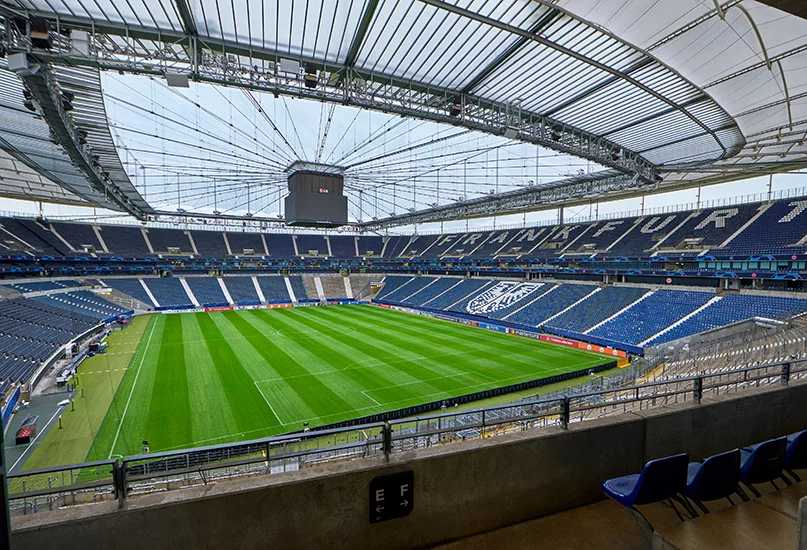
GELSENKIRCHEN
Historically known for coal mining and steelmaking, Gelsenkirchen is dubbed ‘the city of 1,000 fires’ after the mines and blast furnaces that once characterised the area.
Today, the city blends its industrial pedigree with art and leisure. The 1960s marked a turning point for Gelsenkirchen, as mines became recreational areas and cultural sites, and old railway tracks were repurposed into cycling routes.
Musiktheater im Revier is considered one of the most important theatre buildings of the post-war era, where art and architecture merge.
Gelsenkirchen is home to the fallen footballing giant and seven-time German champions, Schalke 04, whose impressive Arena AufSchalke will stage four EURO 2024 fixtures.
HOW: Fly to Düsseldorf Airport, which is located about 40km southwest of the city, and take a 35-minute direct train to Gelsenkirchen Central Station. Alternatively, a taxi journey takes up to an hour and costs about €100. Most attractions are within walking distance from the station.
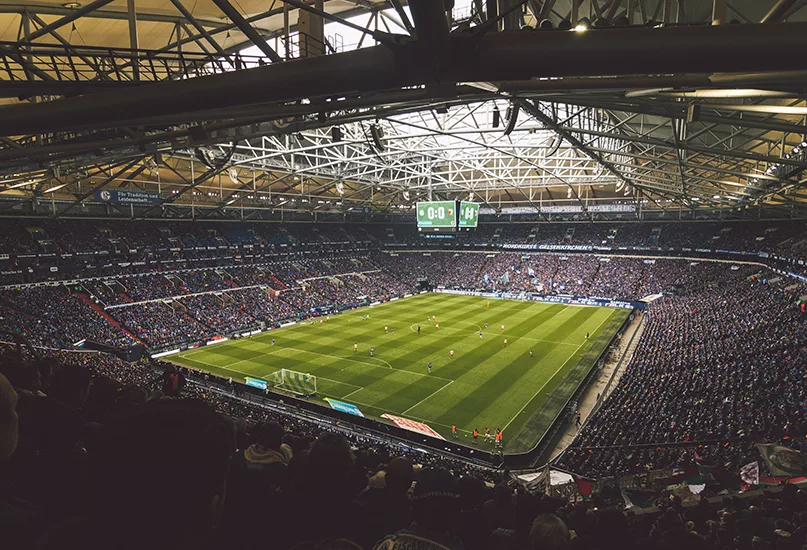
HAMBURG
A bucket list destination for many, Hamburg is the third-biggest city in Europe that is not the capital of its country.
The city’s world-famous Port of Hamburg is Germany’s gateway to the world and a distinctive landmark, whose largest landing site, the St. Pauli Piers, is a major attraction in itself.
Hamburg also boasts impressive architecture, including many beautiful old buildings characterised by clinker brick façades, as well as an electric nightlife. The Reeperbahn in the St. Pauli district is more than just an entertainment area for tourists, as The Beatles first made their name at the street’s Indra music club.
Volksparkstadion Hamburg, which received a significant upgrade in 2000, will be the venue for five games during the tournament.
HOW: Flying to Hamburg, you will land at Hamburg Airport Helmut Schmidt, where trains run every 10 minutes that will take you to Hamburg Central Station in just over half an hour. Buses, taxis, and rideshare services can also be used from the airport. The city centre can be easily explored by using any means of transport.
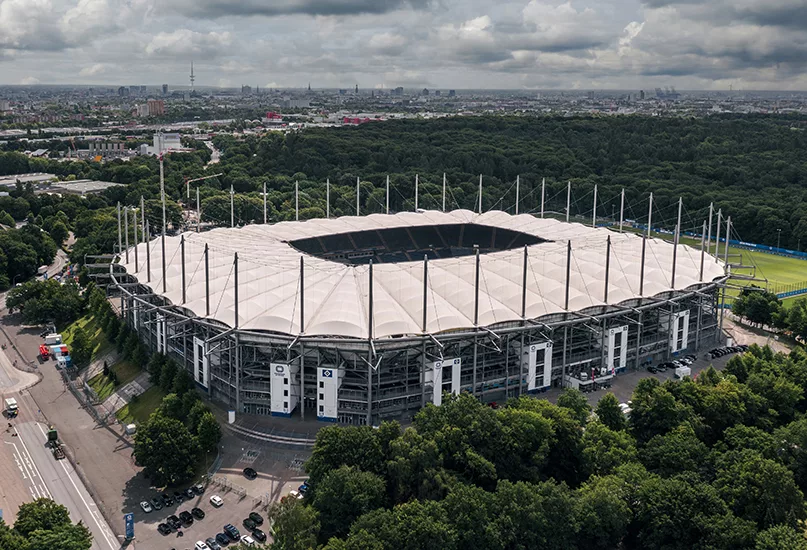
LEIPZIG
Leipzig is steeped in culture and history, which combine to fascinating effect in its renowned rich musical traditions and exquisite architecture.
At 142.5 metres in height, it is impossible to miss Panorama Tower, whose 31st-floor observation deck offers breathtaking views of the city and region.
A thriving arts scene also awaits, including the Leipzig Panometer, a distinct artistic facility that takes you to strange, fascinating worlds and offers unforgettable experiences and historical insights with its 360-degree panoramas.
Four EURO 2024 matches will be staged at Leipzig Stadium, the home of RB Leipzig, which opened in 2004 after being rebuilt inside the former shell of Zentralstadion.
HOW: It takes just under 15 minutes to get from Leipzig/Halle Airport to the city centre on public transport. Leipzig Central Station offers regular long-distance domestic services and was ranked the best European train station in 2021.
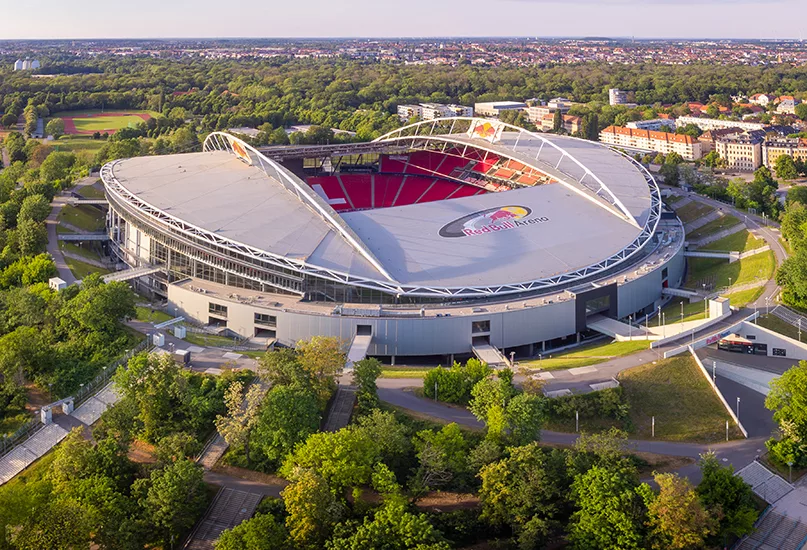
STUTTGART
Mercedes and Porsche, two of the world’s most famous luxury car manufacturers, are based in Stuttgart, whose history in the automotive industry is outstanding.
The city also produces a wide variety of high-quality wines, owing to its mild climate in the heart of southwest Germany and the rich soils of the Neckar Valley.
Enjoy spectacular views from the vineyards or by hiking on the surrounding hills. Alternatively, Stuttgart TV Tower offers sweeping sights of the city and the surrounding area from its two-storey viewing platform.
Stuttgart Arena has a capacity of 51,000 and will host a total of five games during the tournament – four in the group stage and one in the quarter-finals.
HOW: Stuttgart International Airport connects passengers to over 120 destinations worldwide. From the airport, it takes less than half an hour to reach Stuttgart Central Station, which is located in the heart of the city. Stuttgart’s blend of modern and traditional architecture is best enjoyed on foot.
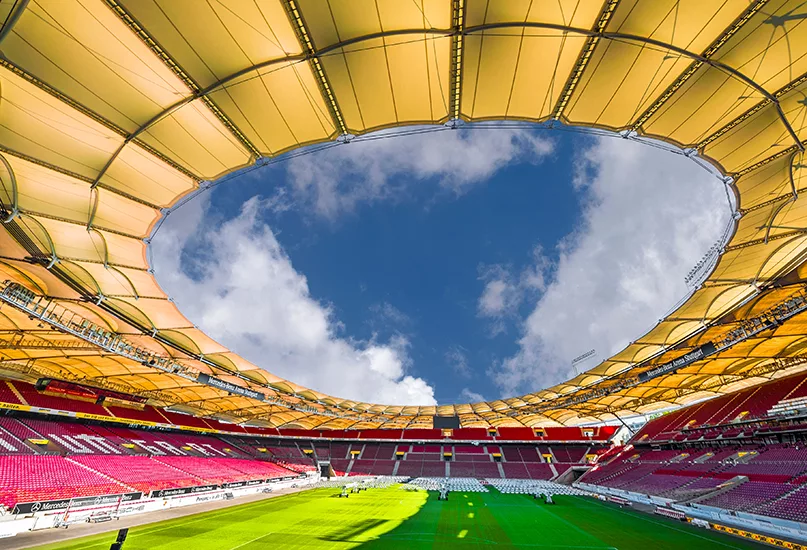
MUNICH
Several of Germany’s largest breweries can be found in Munich, which is famed for its annual Oktoberfest celebrations.
Elsewhere in the Bavarian capital, check out the Deutsches Museum, one of the largest science and technology museums in the world, and the Olympic Park, a prime example of how to successfully repurpose an Olympic venue complete with beer gardens, museums, and impressive viewing areas.
Connect with nature in The English Garden, an extensive inner-city park that covers an area of around 640 football pitches, and explore everything on offer at Viktualienmarkt, a food market and square that has been held daily since 1807 with the exception of Sundays and public holidays.
The Allianz Arena hosted the opener between Germany and Scotland on Friday 14th June, with a further five fixtures to follow, including a semi-final.
HOW: Two terminals serve travellers from more than 140 European destinations at Munich International Airport, which is well connected by public transport to the city centre. There are also frequent rail services to Munich Central Station. The city’s transport network is the most efficient and cheapest way to get around.


